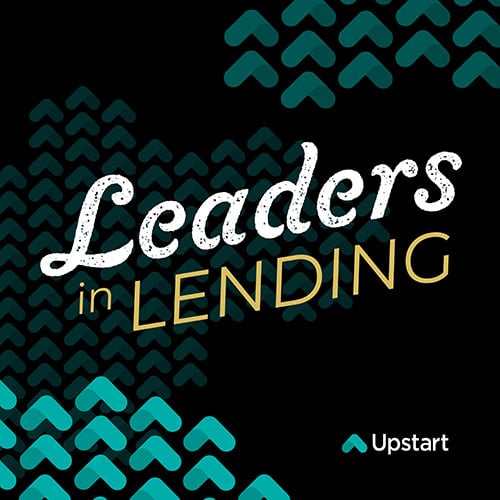Leaders in Lending | Ep. 91
A Fireside Chat with Upstart's CEO, Dave Girouard
On this episode, Upstart’s Co-Founder and CEO, Dave Girouard joins us to talk about how Upstart came to be, the company’s defining moments and where it’s headed.


GUEST SPEAKER
Dave Girouard

ABOUT
Upstart
Upstart is a leading AI lending platform provider that partners with banks and credit unions to help them grow their memberships and expand access to affordable credit. By leveraging Upstart’s all-digital, AI lending platform, Upstart-powered lenders can grow consumer loan portfolios, lend to more creditworthy borrowers safely, and deliver a modern, all-digital experience for their members that allows them to originate loans in minutes. Over 70% of loans funded are fully automated with no human interaction.[1]
Key Topics Covered
- The problem statement for Upstart and the choice to venture into unsecured consumer loans
- The application of AI in the credit process
- The choice to partner with financial institutions
- Adding value in auto, small business and mortgage loan spaces

“The real bright future we see is where the vast majority of people have access to affordable credit, on reasonable terms, in the blink of an eye—not through an elongated or painful process—but when they need it.”

“Becoming a bank didn't feel natural to us. It just felt like we were building great technology here.”

“Building a product that banks would adopt really meant seeing the world from their position and providing the types of controls and visibility and data that meant they could do this responsibly.”
EPISODE RECAP & SUMMARY
Dave Girouard, Co-Founder & CEO at Upstart, believed that young people were "potential rich yet cash poor"—and that dynamic caused them to make poor financial decisions for themselves and the economy as a whole.
There had to be a better way to provide people with affordable access to credit, on reasonable terms, when they needed it.
Using AI and machine learning provided that new way forward.
In this episode, Dave shares how the company came to be and how they provide transformative access to credit for all.
We discuss:
- The problem statement for Upstart and the choice to venture into unsecured consumer loans
- The application of AI in the credit process
- The choice to partner with financial institutions
- Adding value in auto, small business, and mortgage loan spaces
Problem statement for Upstart
The impetus for Upstart spurred from a random series of conversations Girouard was having at the time.
A theme that became increasingly clear was this: young people are potential rich, yet cash poor. That dynamic was leading to decision-making that not only harmed them, but the economy at large.
Girouard became fascinated with consumer access to capital and credit—specifically, how it worked.
Suddenly, reimagining a system that empowered people to access aid that was safe and sustainable became Girouard’s central focus.
Upstart started down a path centered around income share agreements—an alternative version of a loan that allowed the borrower to pay back a fraction of their income instead of a fixed interest rate.
“It was this very novel concept,” said Girouard. “It had been kicked around at the University of Chicago School of Economics for a long time, but we were, I think, the first company to really make a go of it as a platform”.
Ultimately, however, Upstart's founders soon realized that this kind of business model would be impossible to scale.
Toward the end of 2013, the founders decided to pivot and focus their efforts on a product that could do something similar and exist successfully at scale.
The unsecured consumer loan proved to be a reliable option as Upstart’s co-founder Paul Gu built a unique model to accurately predict the potential earnings over the ten-year span of a specific consumer’s career in order to determine whether or not they could finance a loan.
Paul’s model gave Upstart the backbone and competitive edge it needed to establish itself in the market.
Income share → unsecured consumer debt
According to Girouard, thinking about where your strengths can make the biggest difference in the market is the first step in creating a truly useful product.
Initially, Upstart offered both the consumer loan and the income share agreement in parallel up until it saw the obvious demand for the unsecured consumer loan.
The unsecured consumer loan required far less data collection but more complex predictive models. Upstart's founders saw that fintechs at the time were capable of entering this sphere of finance, so the founders knew that it was doable, but creating an origination product was no small feat.
Luckily, Upstart’s modeling capabilities were uniquely advanced, which was why Upstart's founders knew they needed to take on the challenge.
AI lending
To this day, Upstart’s key differentiator is its AI capabilities.
As the amount of data Upstart's models have collected from customers expanded over the years, the models have become more sophisticated.
Upstart's AI and machine learning models began to not only predict binary credit decisions, but they also evolved to predict risks along the entire lending lifecycle.
According to Girouard, the models evolved from simplistic into those that could “predict the likelihood of default and or prepayment for that matter, each month of a loan."
Not only is it important to understand whether or not a risk will default, it actually really matters to know when a consumer will default.
Upstart has also begun to apply their AI to prevent fraud by fortifying their verification processes.
In the past, they expended much effort verifying every piece of input so as to build an unshakable credit decision model. However, after building smarter models backed by more data over the years, they were able to design a process that automated predictions based upon information the consumer already supplied.
This made verification safer, simpler and easier for all parties.
Choosing to partner with FIs
Upstart came to a point where they needed to decide whether they would become a bank or partner with FIs.
The advantages of becoming a chartered bank were plenty— the ability to take deposits, boosting funding, improving liquidity—but Upstart saw the benefit of remaining a technology company and partnering with banks and credit unions instead.
Upstart's founders were beginning to develop great technology and saw more opportunity in helping multiple banks and credit unions reach their goals and help more consumers.
Regulation
After deciding to remain a technology company, Upstart's founders knew that they needed to understand the hesitations banks and credit unions would have about using AI.
“We knew that banks are heavily regulated and conservative by nature, and building a product that banks would adopt really meant kind of seeing the world from their position and providing the types of controls and visibility and data that meant they could do this responsibly,” said Girouard.
It was obvious that the “do things wrong and apologize later” approach would not work in this industry, so Upstart began to engage with regulators from the beginning, sharing transparently their intentions, strategies and products.
After proving this technology could bring competition and abundance to the market, Upstart marketed their services as a toolset that would allow the financial institutions they partnered with to leverage the technology safely and compliantly.
Auto Lending, SMB and Mortgage
Now, Upstart is looking for newer, transformative opportunities. Auto lending, small business products and mortgages are on the horizon.
“They all require a lot of work, but the stronger the base is, the more confident you can feel dealing with the differences between these products, which are not small”, said Girouard.
This is reflective of Upstart’s foundational ethos of contributing support and meaning to market inefficiencies to improve outcomes and deliver value to both lenders and their end customers and members.
Stay tuned for new episodes every week on the Leaders in Lending Podcast.




